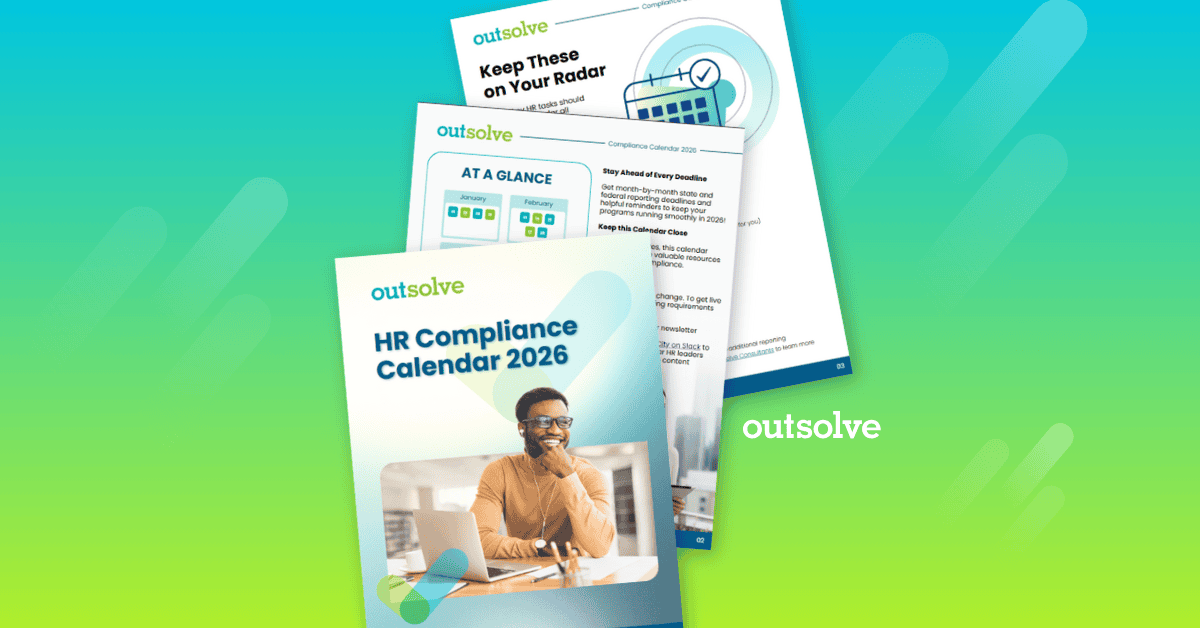5 min read
Legal Series: Navigating the DOJ’s Immigration Enforcement Initiatives Under the New Administration
![]() OutSolve
:
Jun 2, 2025 4:55:32 PM
OutSolve
:
Jun 2, 2025 4:55:32 PM

This article is part of an ongoing legal series designed to provide insight and practical guidance on current and emerging workplace compliance issues. These insights shared by lawyers are based on their interpretation of existing regulations and proposed changes, and intended for informational purposes, not to be regarded as legal advice.
Identifying and pursuing penalties against violators of immigration law is a top priority for the Trump administration. While most immigration enforcement changes impact non-citizens, businesses that employ noncitizens face increased risks, too. Generally, learning about how immigration status relates to the right to work, ensuring I-9 compliance, and keeping extensive and organized records are some of the most effective steps employers can proactively take to reduce those risks.
Trump Administration Immigration Policies and a 2025 DOJ Memo
A DOJ memo issued on January 21, 2025, establishes the tone of the new Trump administration immigration policies, including that:
- Prosecutors should choose the “most serious, readily provable offense” when deciding what crime to charge someone with (a return to a 2017 policy);
- Immigration enforcement agencies like Immigration and Customs Enforcement (ICE) should pursue immigration violations whenever they learn a noncitizen may have committed a crime;
- Criminal enforcement agencies must report all crimes committed by noncitizens to the federal government; and
- States and local governments must cooperate with immigration enforcement.
While the legal enforceability of some of these edicts is unclear, they form the backbone of the Trump administration’s focus on immigration enforcement.
For business owners, the resulting increases in immigration enforcement will likely result in:
- More frequent I-9 audits,
- ICE workplace raids, and
- Civil penalties or even criminal liability for violations.
By acting before issues arise, you can reduce the risk that your business will face significant operational disruption.
Form I-9, Employment Eligibility Verification
Whenever an employer hires an employee in the US, they must complete Form I-9, Employment Eligibility Verification, and the employee must provide identification proving their authorization to work in the US.
Employers are required to:
- Complete an I-9 for each employee,
- Keep I-9s for three years after the date of hire or one year after the date of termination, and
- Provide the forms to the US government if asked.
Employers do not have to file I-9s with the government unless requested in an I-9 audit.
I-9 Audits
The government may target businesses for I-9 audits based on:
- Tips about your business practices;
- Issues in previous audits; or
- Referral from another government agency, like the Internal Revenue Service (IRS), that identifies red flags suggesting potential I-9 noncompliance.
During audits, the government requests extensive documentation, requiring businesses to devote a significant effort to responding.
I-9 Violations
Civil I-9 violations (violations that are not crimes) that an employer may commit include:
- Knowingly hiring or employing a noncitizen who lacks work authorization,
- Failing to complete I-9s,
- Committing or assisting with document fraud or abuse,
- Discriminating based on citizenship or immigration status, and
- Requiring the noncitizen to pay a fee as a bond or indemnity against I-9-related requirements.
Businesses may face criminal liability for engaging in a pattern of hiring undocumented workers or those otherwise not authorized to work in the US.
I-9 Penalties
Employers who fail to follow the I-9 requirements may be subject to I-9 penalties, which include:
- Civil fines,
- Potential criminal liability, and
- Becoming ineligible for government contract work.
The amount of penalties varies by the type and extent of violations.
Minimizing the Risk of Employer Liability
With the administration’s strict approach to immigration enforcement, many business owners are looking to reduce the chances they will get caught in the crossfire. To avoid business disruptions, employers should:
- Learn what valid proof of employment authorization looks like;
- Establish and strictly follow a comprehensive I-9 compliance policy;
- Create contingency plans;
- To the extent possible, avoid ruffling the feathers of individuals who may be motivated to report you for violations, real or imagined; and
- Keep an eye out for issues and address them head-on.
If you have questions or concerns, seek the advice of an attorney and do not help employees cover up a lack of work authorization.
Immigration Status and the Right to Work
Unless well-versed in immigration law, business owners often do not know what to look for to determine whether someone is authorized to work in the US. Notably, you cannot knowingly hire someone who lacks work authorization, but you also cannot discriminate against someone based on immigration status. Along with learning to identify valid employment documents, you may want to speak to an immigration attorney if you have questions about the intersection of those requirements.
US citizens and green card holders
US citizens have the right to work based on their citizenship, which they may prove using a:
- Birth certificate or passport if they became a citizen at birth;
- Certificate of naturalization if they are a naturalized citizen; or
- Certificate of citizenship if they were born outside the US to a US citizen parent, adopted by a US citizen, or became a citizen as a result of their parent's naturalization before they turned 18.
Green cards also automatically grant work authorization.
Temporary work visas
Temporary work visas authorize work in the US for specific purposes. Noncitizens on temporary work visas can generally change employers but can typically only accept work of the same general type as their initial employment.
Employment authorization documents (EADs)
An employment authorization document (EAD) also proves that a noncitizen has work authorization. Noncitizens often prove their right to work using an EAD, including those with:
- Active asylum applications,
- Pending green card applications,
- Deferred Action for Childhood Arrivals (DACA) status,
- Temporary Protected Status (TPS),
- Asylum or refugee status, and
- Derivative status based on a spouse being in the US on certain temporary visas.
Notably, except for DACA recipients, applying to renew before the current EAD expires generally extends the noncitizen’s employment authorization for 540 days while USCIS considers the application. The right to continue using an expired EAD results from sluggish USCIS processing times. For many noncitizens, receiving a new EAD before their current EAD expires is impossible because you must apply for renewal within 180 days of the EAD’s expiration date, and USCIS is taking longer than 180 days, sometimes much longer, to process renewal applications. Noncitizens in this situation can prove they have the right to work by providing their EAD and a notice from USCIS confirming that they applied for renewal before their current EAD expired.
Compliance Policies to Avoid an I-9 Audit
The best defense to an I-9 audit is a good offense: comprehensive and efficient compliance guided by a thorough policy. That policy should require that you:
- Complete an I-9 for every employee on their first day of work;
- Keep clear, detailed, and organized records; and
- Use tools to verify work authorization, like the E-Verify program.
Addressing the Risk of ICE Workplace Raids
ICE workplace raids can decimate businesses and communities. To address the potential of a workplace raid, create a contingency plan and ensure supervisors know it. Treat employees with respect and pay them a fair wage. Poor working conditions are, unfortunately, a frequent precursor to ICE raids, so treating employees well goes a long way, too.
Proactive Preparation
The Trump administration is focusing on immigration enforcement, which will likely result in more frequent audits and ICE raids on businesses. Meticulous I-9 compliance and learning can help you reduce the risk that new policies will disrupt your operations.
Outsolve can help offer guidance for HR compliance related topics. Contact us today.
Resources:
USCIS, Automatic Employment Authorization Document (EAD) Extension, link.
USCIS, Check Case Processing Times, link.
USCIS, Employment Authorization Document, link.
USCIS, I-9, Employment Eligibility Verification, link.
USCIS, N-600, Application for Certificate of Citizenship, link.
USCIS, Penalties, link.
USCIS, Temporary (Nonimmigrant) Workers, link
USCIS, I-765, Application for Employment Authorization, link.
Office of the Attorney General, Department Charging and Sentencing Policy, May 10, 2017, link
Office of the Attorney General, Interim Policy Changes Regarding Charging, Sentencing, And Immigration Enforcement, link.
U.S. News & World Report, These Are the Lawsuits Against Trump’s Executive Orders, link.
National Immigration Forum, The First 100 Days of the Second Trump Administration: Key Immigration-Related Actions and Developments, link.
Founded in 1998, OutSolve has evolved into a premier compliance-driven HR advisory firm, leveraging deep expertise to simplify complex regulatory landscapes for businesses of all sizes. With a comprehensive suite of solutions encompassing HR compliance, workforce analytics, and risk mitigation consulting, OutSolve empowers organizations to navigate the intricate world of employment regulations with confidence.
Weekly OutLook
Featured Posts

New Year, New Deadlines: 2026 HR Compliance Calendar

outRageous HR: Plan Now or Pay Later
Related Posts

OFCCP Continues to Enforce Veterans Affirmative Action Obligations
On January 7, 2026, OFCCP published a routine Notice in The Federal Register informing government contractors and subcontractors that it intends to...

File Smarter, Not Harder: Start the Year with OutSolve
HR faces similar challenges every January, whether it’s a sudden rush of deadlines, new regulations to understand, updating labor law posters, or...

New York City Pay Equity Report: What it Entails
The New York City Council voted to pass an amendment in December 2025 requiring private employers to report pay data annually. This legislation also...
